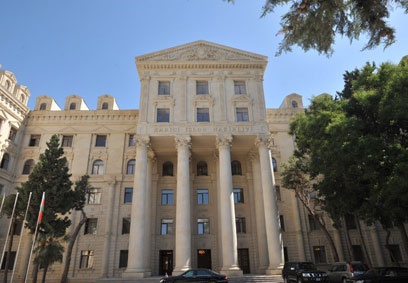Baku slams Nezavisimaya Gazeta article for distortion of facts on Nagorno-Karabakh

By Sara Rajabova
Azerbaijan’s foreign ministry has lambasted the Russian political analysts for his recent article about Azerbaijan’s occupied Nagorno-Karabakh region.
“There are political, legal, historical and religious frauds in Anton Yevstratov’s article titled “The belfries and minarets of Karabakh,” which is obviously written by the author on an order,” said Hikmet Hajiyev, the head of the press service of Azerbaijan’s foreign ministry on August 20.
Hajiyev made the remark commenting on the article published in the Nezavisimaya Gazeta on August 19.
He said the Armenian created illegal regime exists on Azerbaijan’s occupied territories and exists as a result of Armenia’s continued occupation and aggression.
“The author, who writes that 99.9 percent of the population in the occupied territories are Armenians, in fact confirms that the local Azerbaijani population was subjected to ethnic cleansing. I’d like to remind the author that before the conflict of 1988, some 74 percent of the Nagorno-Karabakh autonomous region’s population was Armenians, 24 percent - Azerbaijanis, 2 percent - Russians, and other peoples. Now it is a mono-ethnic composition comprised of Armenians,” Hajiyev said.
In his article, Yevstratov claimed that the Armenian Church has allegedly played a great role in the history of Nagorno-Karabakh citing the Ganjasar monastery as an example.
Hajiyev, however, noted that Armenians are an alien people in the South Caucasus and that it is absurd to speak of the “historical” role of the Armenian Church in the territory of Karabakh and present-day Armenia.
“Distorting the name of the Ganjasar monastery, the author doesn’t take in to account one thing. If the Ganjasar monastery was created as a purely ‘Armenian’ monastery, then why did Prince Hasan Jalal, who had this temple built, order the inscription ‘the Albanian capital’s temple built for my Albanian people,’ on it?” Hajiyev asserted.
Similarly, the Christian population of the mountainous part of Karabakh called themselves Albanians in a letter to the Russian Tsar Peter I, the diplomat added.
Hajiyev went on to say that Armenian Church, which fought with the Albanian Church for centuries, sought to subdue and then eliminate it.
“The Albanian letters were destroyed in 1836, when by the decision of the Russian Synod, the Albanian church was placed under the authority of the Armenian Church,” he said.
Hajiyev also mentioned the author’s distortion of information about the material and cultural heritage belonging to the Islamic religion of the Azerbaijani people on the occupied territories.
Hajiyev said the Demirbulag mosque of the Azerbaijani people was completely destroyed on the territory of present-day Armenia, noting the vandalism and desecration of the Juma mosque located in the Aghdam region, as well as Yukhari Gevharaga mosque in Shusha.
“As one can see from the article, the author illegally visited Azerbaijani occupied territories and violated the law of Azerbaijan ‘On State Border’ and is involved in the ordered falsification of the history of Azerbaijan and supports the self-proclaimed regime,” he said.
Hajiyev noted that after due investigation, the author's name will be included in a list of undesirable persons.
Unauthorized visits to Nagorno-Karabakh and other occupied regions of Azerbaijan are considered illegal and individuals who pay such visits are included in the Azerbaijani Foreign Ministry's "black list."
Azerbaijan has repeatedly warned foreign officials and diplomats against unauthorized visits to territories under Armenian occupation, stating that such visits violate international law.
Armenia occupied over 20 percent of Azerbaijan's internationally recognized territory, including Nagorno-Karabakh and seven adjacent regions, after laying territorial claims against its South Caucasus neighbor that caused a brutal war in the early 1990s. Long-standing efforts by U.S., Russian, and French mediators have been largely fruitless so far.
--
Sara Rajabova is AzerNews’ staff journalist, follow her on
Twitter: @SaraRajabova
Follow us on Twitter @AzerNewsAz
Here we are to serve you with news right now. It does not cost much, but worth your attention.
Choose to support open, independent, quality journalism and subscribe on a monthly basis.
By subscribing to our online newspaper, you can have full digital access to all news, analysis, and much more.
You can also follow AzerNEWS on Twitter @AzerNewsAz or Facebook @AzerNewsNewspaper
Thank you!
